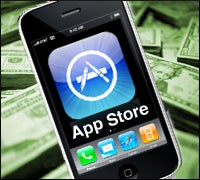 |
Apple’s App Store today surpassed 2 billion downloads, proving that the iPhone maker still reigns supreme in the mobile app world.
The company, which started a cultural and technological phenomenon when it opened the App Store in July 2008, shows no sign of leveling off, based on figures released by Apple.
Instead, downloads are continuing at a brisk pace. In mid-July on the store’s first birthday, Apple said App Store downloads had surpassed 1.5 billion. On Sept. 9, Apple (NASDAQ: AAPL) CEO Steve Jobs had said during a company event that downloads had grown to 1.8 billion.
App inventory is now up to 85,000 apps, serving more than 50 million iPhone and iPod touch customers worldwide and over 125,000 developers in Apple’s iPhone Developer Program, according to the company.
“The App Store has reinvented what you can do with a mobile handheld device, and our users are clearly loving it,” Jobs said in a statement.
There have been some bumps along the way, as developers continue to gripe about the app approval process for the store — claiming that Apple’s approval criteria are opaque.
Apple also has come under scrutiny by the FCC in regard to how it handled the submission of Google Voice for the iPhone, a mobile VoIP app, with conflicting reports being submitted by Google (NASDAQ: GOOG) and Apple regarding the current status of the app. Apple says it’s still under review, but Google claims it was rejected outright.
Still, today’s figures demonstrate that the App Store is still king in the mobile app domain, which has inspired other players in the wireless industry to try to catch up.
Since the launch of the App Store, BlackBerry maker Research In Motion (NASDAQ: RIMM) opened up BlackBerry World and partnered with Verizon Wireless to create VCast, another app store based on the networks APIs, set to open later this year.
Rival Palm (NASDAQ: PALM), which this year introduced its new mobile operating system webOS, debuted the Palm App Catalog in beta when the Palm Pre went on sale in early June. Palm is widely expected to officially launch the app store this week. In late June, mobile advertising firm Medialets in a blog post estimated that the Palm App Catalog reached 1 million downloads.
[cob:Special_Report]Google took a different approach by opening an app store — Android Market — based on an OS rather than on one backed by a specific handset or smartphone manufacturer. Android was recently updated to version 1.6 to coincide with a makeover of the marketplace ahead of Motorola’s (NYSE: MOTO) Android-powered holiday handset releases later this year.
Google does not disclose the number of Android Market downloads or available apps. However, AndroLib, a Web site that lets users browse the store from a computer rather than a handset, recently reported that there are a bit more than 10,000 Android apps available in the nearly one-year-old app store.
Also competing in the crowded mobile app landscape is Nokia (NYSE: NOK), which recently revamped its Ovi app store and issued a new Ovi SDK for developers.
Meanwhile, Microsoft (NASDAQ: MSFT), slated to release a slew of new smartphones on Oct. 6 based on the Windows Mobile 6.5., is planning to open Windows Mobile Marketplace before the end of the year.


